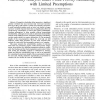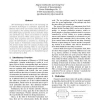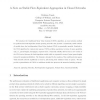365 search results - page 26 / 73 » Semi-automatic derivation of timing models for WCET analysis |
CDC
2009
IEEE
15 years 3 months ago
2009
IEEE
—In kernel based regression techniques (such as Support Vector Machines or Least Squares Support Vector Machines) it is hard to analyze the influence of perturbed inputs on the ...
ICCAD
2007
IEEE
15 years 8 months ago
2007
IEEE
— In ultra-deep sub-micron technologies, modeling waveform shapes correctly is essential for accurate timing and noise analysis. Due to process and environmental variations, ther...
RTS
2011
14 years 6 months ago
2011
—Preemptive scheduling often generates a significant runtime overhead that may increase task worst-case execution times up to 40%, with respect to a fully non preemptive executi...
ETFA
2006
IEEE
15 years 5 months ago
2006
IEEE
New technological trends lead to the increasing use of network technologies in automation. Especially the Ethernet with TCP/IP and wireless networks find growing acceptance. The r...
128
click to vote
QUESTA
2008
14 years 11 months ago
2008
We introduce the Conditional Mean Value Analysis (CMVA) algorithm, an exact solution method for product-form load-dependent closed queueing networks that provides a numerically st...



